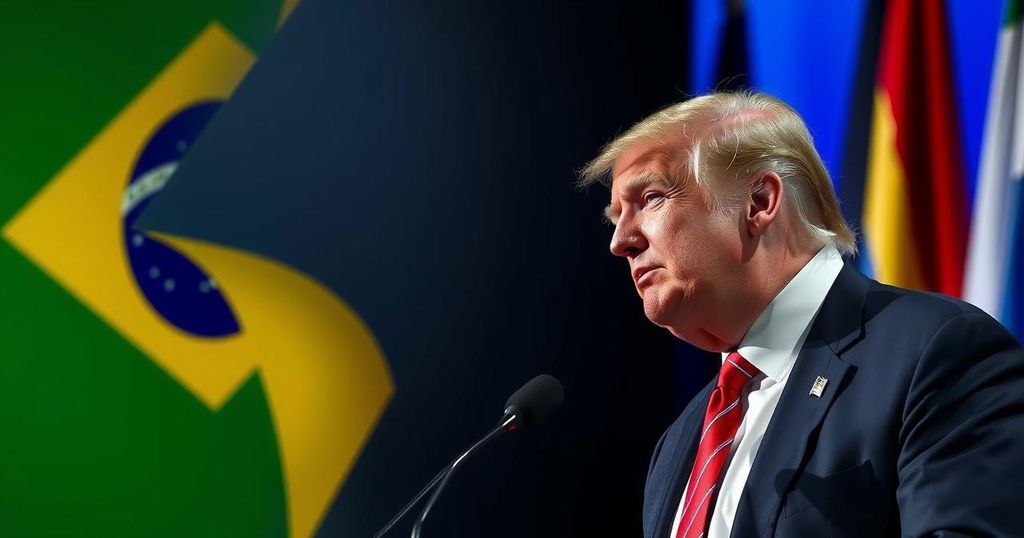President Biden’s six-day visit to Peru and Brazil coincides with international summits that represent a significant moment in his presidency. Although Biden aims to solidify alliances and discuss key global issues, attention from world leaders remains on Donald Trump and potential policy shifts as he appears poised for a return to office. Biden’s discussions, particularly with Xi Jinping, will be vital in navigating the complexities of U.S. relations and global diplomacy during this transitional period.
On Thursday, President Joe Biden embarked on a significant six-day journey to Peru and Brazil, coinciding with the last major international summits of his presidential tenure. This trip includes participation in the Asia-Pacific Economic Cooperation (APEC) summit in Peru and attendance at the Group of 20 leaders’ summit in Brazil, providing Biden a crucial opportunity to engage with fellow world leaders. Despite Biden’s efforts, global attention is predominantly centered on Donald Trump’s potential return to the presidency, as leaders from various nations assess the implications of his expected shift in U.S. foreign policy. World leaders have begun to reach out to Trump, anticipating key appointments in national security and foreign policy, including his selection of East Asian leaders to work with moving forward. South Korean President Yoon Suk Yeol has even shown a readiness to reinforce ties with Trump by dusting off his golf clubs. Analysts have remarked that the current climate presents a distinct challenge for Biden, who is viewed as a “lame duck” given that his policies are set to differ significantly from those likely pursued by Trump. Despite this, White House officials assert that Biden’s participation in APEC and G20 summits will address pressing global issues such as climate change, infrastructure development, and international drug trafficking. During his meetings, including a significant engagement with Chinese President Xi Jinping, Biden aims to underscore the importance of alliances to U.S. national security. National security adviser Jake Sullivan noted the enduring commitment to building strong relationships with allies as critical for U.S. leadership on the global stage. Amidst these diplomatic discussions, Biden’s upcoming meeting with Xi will be particularly pivotal, coming after a series of tensions involving trade relations and security concerns regarding China. Biden has managed a cautious dialogue with Xi, progressively raising concerns about China’s influence on global security and its relationship with Russia. As Biden traverses these international engagements, he aims to reaffirm the resilience of democratic transitions, countering any uncertainties that might arise from Trump’s anticipated policies. Biden’s visit also marks a historic moment as he will be the first sitting U.S. president to publicly visit the Amazon rainforest. Political analysts predict that this visit may serve to bolster global confidence in the U.S. commitment to combat climate change and support international cooperation. Ultimately, Biden seeks to ensure that while change is on the horizon, the foundations of global diplomacy and international alliances remain unshakable.
This article pertains to President Joe Biden’s pivotal trip to South America, particularly Peru and Brazil, where he is participating in critical international summits at the end of his presidency. The context involves a looming transition in U.S. leadership as Donald Trump appears set to return to political prominence. The juxtaposition of Biden’s efforts to solidify alliances with the anticipation surrounding Trump’s policy shifts underscores a moment of significant tension and uncertainty in global diplomacy. Biden’s administration grapples with various issues, including climate change, global security, and international trade, while maintaining diplomatic dialogues with key world leaders, notably Xi Jinping of China. As Biden seeks to reassure international partners about the strength of U.S. democratic processes, his trip also symbolizes an essential moment for reaffirming commitments amidst this anticipated change in administration.
In conclusion, President Biden’s diplomatic mission to Peru and Brazil signifies a critical juncture in international relations as he faces the specter of Donald Trump’s return to the presidency. While engaging in essential discussions with global leaders, Biden is tasked with reinforcing U.S. commitments to democracy, climate action, and international alliances. The dynamics of this visit reveal not only the importance of strong bilateral relationships but also the complexities involved in transitioning leadership in the face of shifting geopolitical landscapes. Overall, this moment reflects both the achievements and the ongoing challenges of U.S. foreign policy.
Original Source: www.wsbt.com






